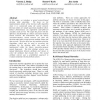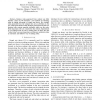CORR
2010
Springer
15 years 1 months ago
2010
Springer
In this paper, an approach to facilitate the treatment with variabilities in system families is presented by explicitly modelling variants. The proposed method of managing variabi...
INFORMATICASI
1998
15 years 1 months ago
1998
Decision table decomposition is a machine learning approach that decomposes a given decision table into an equivalent hierarchy of decision tables. The approach aims to discover d...
IJON
2006
15 years 2 months ago
2006
In this paper, we introduce a neural network -based decision table algorithm. We focus on the implementation details of the decision table algorithm when it is constructed using t...
108
click to vote
ISCI
2008
15 years 2 months ago
2008
As two classical measures, approximation accuracy and consistency degree can be employed to evaluate the decision performance of a decision table. However, these two measures cann...
110
click to vote
FSS
2008
15 years 2 months ago
2008
Classical consistency degree has some limitations for measuring the consistency of a decision table, in which the lower approximation of a target decision is only taken into consi...
107
click to vote
AAAI
1990
15 years 3 months ago
1990
A formal equivalence between propositional expert systems and decision tables is proved, and a practicable procedure given to perform the transformation between propositional expe...
117
click to vote
GRC
2005
IEEE
15 years 7 months ago
2005
IEEE
— Decision rules generated from reducts can fully describe a data set. We introduce a new method of evaluating rules by taking advantage of rough sets theory. We consider rules g...


